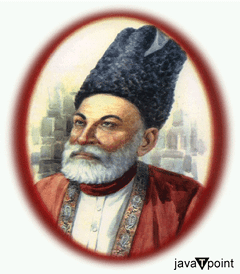Mirza Ghalib
IntroductionFamous Indian poet Mirza Beg Asadullah Khan was born at Kala Mahal, Agra, on December 27, 1797. He also wrote under the pen names Mirza Ghalib and Asad. He was from a Mughal family that had settled in Samarkand following the overthrow of the Seljuk monarchs. The dynamic political environment of his day is vividly portrayed in Ghalib's life and poetry. His writings were crucial in depicting the fall of the Mughal Empire under the control of the British East India Company and the events that followed the Indian Rebellion of 1857. He wrote in both Urdu and Persian, but his Urdu poetry is what brought him the most acclaim. Ghalib's influence resonates among the Hindustani diaspora all over the world and transcends the Indian subcontinent. Early Life and InfluencesGhalib was born into a family with Central Asian ancestry, and his ancestors were connected to the Mughal aristocracy. He was educated in Persian, Arabic, and Turkish, and at the age of 11, he started writing poems. Ghalib suffered early difficulties following the unexpected deaths of his father and uncle, and his marriage to Umrao Begum signaled the start of a turbulent personal journey. The existential challenges he saw in life were frequently reflected in his poems. Scholars disagreed on his connection with his wife; some described her as pious and traditional. Struggles and AdversityFollowing a turbulent youth, Ghalib relocated to Delhi in 1812. He was plagued by financial instability, reliance on customers for assistance, and living off borrowed money, which worsened his problems. Ghalib's personal life was full of difficulties because he didn't have a reliable source of income or a home. He had seven children with Umrao Begum, but their marriage was troubled, and tragically, each of their infants passed away. Despite his abilities, Ghalib only received a small amount of respect in the courts in Delhi and Lucknow. Titles and PatronageGhalib was well-known in the Mughal court because of his writing talent. He received honorific titles like Dabir-ul-Mulk and Najm-ud-daula from Emperor Bahadur Shah Zafar. Due to his connections with the Mughal court, Ghalib was able to instruct the Emperor and the Emperor's family in poetry. Ghalib's impact survived through the fall of the Mughal Empire and the rise of British control. He sought royal favor and pensions due to financial difficulties, which highlighted his need for approval and assistance. Literary Development and ContributionsEarly exposure to Persian and Arabic by Ghalib established the groundwork for his distinctive style, which combined various linguistic and poetic traditions. He went beyond the confines of the conventional ghazal to address a variety of subjects. He frequently left the identity and gender of the beloved in his lines unclear, allowing him to freely explore philosophical and existential subjects. His writing style, which was informal and conversational and reflected his wit and humor, was on display in the letters he sent to various people. Ghalib's trip to Calcutta was crucial in influencing his literary career since it inspired him to adopt Persian in addition to Urdu. Influence and LegaciesThere is no denying Mirza Ghalib's influence on Urdu writing. His writings resonate with people all over the world and cut beyond time and culture. He struggled during his lifetime, but he believed that his fame would increase in succeeding generations. Ghalib's poetry has remained a source of inspiration and enchantment for readers, solidifying his reputation as one of the most renowned poets in Urdu literature. Depth in Philosophy and Current RelevanceGhalib's insightful worldview addressed existential issues, faith, happiness, sadness, life, and death. Instead of being cynical, his disappointment with life's intricacies was rooted in reality. Ghalib's influence has only gotten stronger with time, enthralling the current generation with his synthesis of intellectualism and spiritual longing. His intimate and elegant Urdu letters add to his lasting legacy because of how they reflect his character. Religion and Society PerspectivesGhalib had a wide range of religious convictions. In his writings, he showed respect for the Prophet Muhammad while denouncing the hypocrisy and actions of some clergy. In his poetry "Chiragh-i-Dair," which reflected his perspective on Hindustan, he gave a thoughtful portrait of the Indian continent. DeathOn February 15, 1869, Ghalib passed away, leaving behind a legacy that rose to prominence after his passing. Actors like Bharat Bhushan and Naseeruddin Shah have portrayed him in movies and theatrical shows that have been based on his life. His profound creative expressions are eternal because his ghazals have been performed by well-known singers throughout South Asia. ConclusionIn conclusion, Mirza Ghalib's life is a tapestry of individual challenges, creative genius, and provocative perceptions of religion and society. His contributions to Persian and Urdu literature have endured through the ages, solidifying his status as a legendary author.
Next TopicSurekha Punekar
|
 For Videos Join Our Youtube Channel: Join Now
For Videos Join Our Youtube Channel: Join Now
Feedback
- Send your Feedback to [email protected]
Help Others, Please Share









